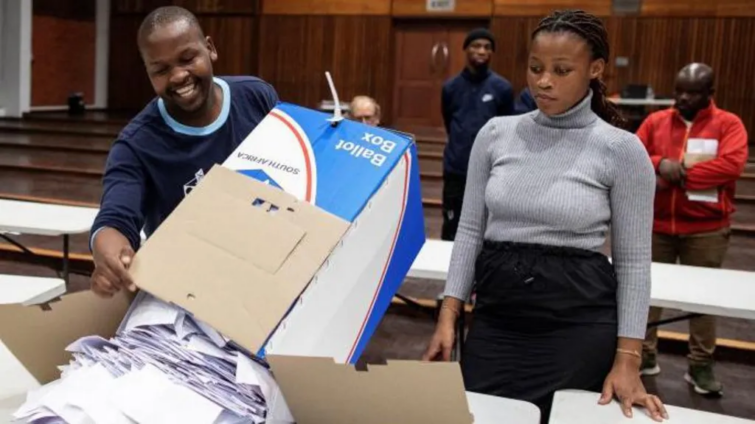South Africa's ruling party, the African National Congress (ANC), is on course to lose its majority in parliament for the first time since it came to power 30 years ago, partial results from Thursday's parliamentary election suggest.
With results from around 43% voting districts counted so far, the ANC is leading with 43%, followed by the Democratic Alliance (DA) with 24%.
Both the radical Economic Freedom Fighters (EFF) and the uMkhonto weSizwe Party (MK Party) of former President Jacob Zuma are on around 10%.
Final results are expected over the weekend.
Many voters blame the ANC for the high levels of corruption, crime and unemployment in the country.
The respected Council for Scientific and Industrial Research (CSIR) and the News24 website have projected that the party's final vote could be around 42%, a big drop from the 57% it obtained in the 2019 election.
This would force it go into a coalition with one or more of the other parties in order to form a majority in parliament.
The DA has liberal economic policies, while both the EFF and MK favour more state intervention and nationalisation, so the choice of partner would make a huge difference to South Africa's future direction.
It is unclear whether President Cyril Ramaphosa will remain in power, as he could come under pressure from the ANC to resign if the party gets less than 45% of the final vote, said Prof William Gumede, chairman of the non-profit Democracy Works Foundation.
"The ANC could turn him into a scapegoat, and a faction within the party could push for him to be replaced by his deputy, Paul Mashatile. The EFF and MK are also likely to demand his resignation before agreeing to any coalition with the ANC," Prof Gumede told the BBC.
South Africans do not directly vote for a president. Instead they vote for members of parliament who will then go on to elect the president.
According to the electoral commission, the last polling station closed at 0300 on Thursday morning local time.
One electoral official in Johannesburg told the BBC the queues were reminiscent of the historic 1994 election, when black people could vote for the first time.
Sifiso Buthelezi, who voted in Johannesburg's Joubert Park - the biggest polling station in South Africa - told the BBC: "Freedom is great but we need to tackle corruption."
Change has been a recurring sentiment, especially among young voters.
"The turnout amongst them was high, and they voted against the ANC," Prof Gumede said.
Ayanda Hlekwane, one of South Africa's "born-free" generation, meaning he was born after 1994, said despite having three degrees he still did not have a job.
“I’m working on my PhD proposal so that I go back to study in case I don’t get a job,” he tells the BBC in Durban.
But Mr Hlekwane said he was optimistic that things would change.
Support for the ANC is expected to be higher among the older generation.
One 89-year-old woman, Elayne Dykman, told the BBC she hoped that young people in South Africa did not take their vote for granted.
According to the electoral commission, the last polling station closed at 0300 on Thursday morning local time.
One electoral official in Johannesburg told the BBC the queues were reminiscent of the historic 1994 election, when black people could vote for the first time.
Sifiso Buthelezi, who voted in Johannesburg's Joubert Park - the biggest polling station in South Africa - told the BBC: "Freedom is great but we need to tackle corruption."
Change has been a recurring sentiment, especially among young voters.
"The turnout amongst them was high, and they voted against the ANC," Prof Gumede said.
Ayanda Hlekwane, one of South Africa's "born-free" generation, meaning he was born after 1994, said despite having three degrees he still did not have a job.
“I’m working on my PhD proposal so that I go back to study in case I don’t get a job,” he tells the BBC in Durban.
But Mr Hlekwane said he was optimistic that things would change.
Support for the ANC is expected to be higher among the older generation.
One 89-year-old woman, Elayne Dykman, told the BBC she hoped that young people in South Africa did not take their vote for granted.
Latest Stories
-
This Saturday on Newsfile: GH¢1 fuel levy and OSP declaring Ofori-Atta wanted again
10 minutes -
Mahama announces steps to improve Islamic education nationwide
45 minutes -
Eidul al-Adha: Drugs worse than alcohol – Imam Suleman warns Muslim youth
1 hour -
Fuel Levy: What crime have Ghanaians committed? – Dr Amin Adam questions gov’t
2 hours -
Postecoglou sacked by Spurs after Europa League win
3 hours -
Employee fraud is everywhere, be intentional about stopping it – Expert counsels
4 hours -
We have a very good chance of making it to the World Cup – Jordan Ayew
4 hours -
Innovation Hubs as Engines of Sustainability: Charting Ghana’s path with lessons from the Hamburg Sustainability Conference 2025
4 hours -
UHAS makes history with publication of landmark study in Nature Human Behaviour
5 hours -
Asante Gold Corporation commended for community development projects in W/N region
5 hours -
World Environment Day: Stakeholders urge collaborative effort for sustainable ecosystem restoration
5 hours -
Photos: Thousands of Muslims observe Eid al-Adha 2025 at Independence Square
5 hours -
Russia launches ‘massive’ strikes days after Ukrainian drone attack
5 hours -
Ghana, Morocco agree to Visa-free travel for Ghanaians, says Foreign Affairs Minister
5 hours -
Samson Anyenini and OneGhana Movement renew calls for compensation for June 3 victims
5 hours

